Grocery Update Volume 1, #1
Premier issue for friends and family! We intend to publish weekly, hopefully every Thursday with seasonal/special editions. We anticipate @50 issues a year so that subscribers get their money's worth!
Discontents: 1. Walmart Layoffs. 2. Foxtrot Workers Fight Back. 3. Shoptalk with Eve Cohen: Demystifying the Wholesale sector. 4. NEW IPES-Food report: The Land Squeeze. 5. Retail Visits: Reading Terminal Market. 6. Product reviews. 7. Reading Lists. 8. Grocery Nerd retail observations. 9. Tunes.
Walmart is the USA’s largest private employer (1.6 million employees, second only to the Dept. of Defense), largest retailer ($420 billion in 2023), largest grocery chain (@30% of all grocery sales) and among the largest recipients of corporate welfare in the form of SNAP and Medicaid for employees. They expanded during a period of lax antitrust and pricing regulatory oversight. They more or less invented modern logistics. And they are essentially a family business, with the Walton Clan still owning around 45% of the company. And they still do business the old fashioned way. When business slows, they balance the books by trimming headcount and cutting expenses (and raising prices). Expendability is built into the employment model. It’s why they stay 100% union-free. They do this layoff stuff like clockwork, like this time, and that time, and the time before that, and so on, ad nauseam. It’s about the Fundamentals!
Hundreds of workers will lose their jobs in Bentonville and hundreds more will be asked to relocate from remote hubs in Dallas, Atlanta and Toronto to central offices in Bentonville, San Francisco and Hoboken. Workers taking a pink slip will get two weeks severance for every year employed, a bit cheap coming from a company owned one of the world’s wealthiest families. This is a huge bummer for all these workers and we wish them the best. Lots of talent out there in the grocery, retail and supply chain sector, with UNFI laying folks off and many small and emerging brands running out of cash and shutting down.
Walmart of course could do better, perhaps reorganizing their business around the needs and ambitions of their employees, selling the majority of shares back to become employee-owned or even better, transitioning into a worker-owned cooperative a la Mondragon. Call me a dreamer! Instead, investors, Walton trust funders and institutional shareholders will be relieved to see such discipline around G&A costs. Can’t wait for that next round of dividends and buybacks!
So, alongside their recent hipster-fied private label launch (more on that later), Walmart will continue to compete as mercilessly as they always have. You don’t get to be #1 in grocery by playing nice.
Foxtrot was until recently the darling of retail innovation. A tech-enabled, Gen-Z pandering, localized and upscale convenience store of the future, they quickly expanded to over 30 stores across half a dozen cities. How? By convincing investors that this model could scale profitably, despite high cost of goods, scattered wholesale strategies, high rent and very high corporate overhead, including . Over $190 million was dumped into the business since 2014. And then on April 23, they abruptly shut down, leaving vendors, employees and communities in the lurch. Our friend Shayna Harris covered this from the POV of small and emerging brands. We let her know we would pick up the baton and hear from the workers. We spoke with Adela Maravilla, a former commissary worker who has helped organize a class action lawsuit to get some rightful severance from the Foxtrot clown show. And she had things to say! Here’s a quick excerpt:
“There was a very different way this could have been handled, something tremendously valuable that could have been extended to us. And that thing is time. If there had been transparency and we had known as the company knew that there were concerns about operations and that there was a looming closure, we could have made some plans. We could have looked for other work. It could have minimized the impact of the company wide shut down for us. And when you conduct yourself in a moral and ethical way and you see the dignity and value of your workforce and you extend them that respect, that helps to breed a lot of goodwill. And that's beyond what you would do if you were a good person. That's also good business. And that wasn't the case here.”
The Checkout Podcast continues ever onward, free for all listeners. 181 episodes in and we are not slowing down. Recently, we started a collaborative series with grocery innovator Eve Cohen called “Shoptalk”. Instead of a one way interview, it is chit-chat/deep dive into a particular grocery topic. In “Shoptalk #1” we gave an overview of grocery retail, the big picture, the whole she-bang of $1 Trillion in annual sales. “Shoptalk #2” is even more fun. We dig into the wholesale sector. Wholesale, or distribution, is what connects manufacturers to retailers. They aggregate millions of products daily. They are massive, vital links in the food supply that most of us don’t ever think about. Think of food hubs, but 1,000 times bigger, meaner and much more obfuscating in their operations, business models, contractual obligation to and from retailers and manufacturers, how they move product around, how they achieve profitability, how they extract value, etc., etc. This is essential listening if you work in the industry. Don’t leave home without it. Enjoy on your favorite podcast platform!
IPES-Food is a think tank composed of food sector activists, scholars, farmers, workers and do-er’s (including yours truly!), primarily from Global South/Majority World nations. They are folks doing on the ground food sovereignty work and creating praxis around ensuring a more just and sustainable food supply. Their latest report on land hoarding is a banger:
Land is critical to the lives, livelihoods, and food security of millions of people across the world. But a series of unprecedented pressures on global farmland are driving a “land squeeze” that is worsening land inequality, rural poverty, and food insecurity.
Farmers, Indigenous Peoples, peasants, and pastoralists are losing their land, and losing their culture, livelihoods, and rural traditions, while young farmers face huge barriers to access farmland.
Globally, 1% of the world’s largest farms control 70% of the world’s farmland. This time, the threats are even greater, as land grabs proliferate into new and obscure forms, and farmers and communities are squeezed from all sides. Full report here.
IPES-Food identifies four trends driving this land squeeze and exacerbating land inequality around the world:
Retail visits: We LOVED going to Reading Terminal Market in Philadelphia recently. In general, we love public markets. They will be an ongoing theme, as much as or even moreso than grocery stores and supermarkets. Public markets have so much energy. They are always unique (unique is after all, an absolute, you cannot qualify “unique”). You find the coolest foods and vendors at public markets. Most stalls are family or independently owned and have been there for many years.
What did we love? THE VIBE. It was Wrestlemania weekend and Philadelphia was packed. But not mean or manic, just energized for whatever WWE nonsense 100,000 fans came to see.
What else did we love? THE FOOD. Obviously. The presentation, the full sensory experience, the bountiful displays, the samples, the hard working hawkers and cashiers. This electric, rainbow of sight, sound, smell and taste was a big inspiration for me in the pre-Amazon Whole Foods days, kind of the anti-supermarket. The zocalo, the souk, the town square, the market street, there is something in our deep cultural memory of what public markets accomplish. retailers wish they could capture that awe.
Reading has a storied history and is usually in the top 10 lists of travel sites for public markets. My personal favorites there that I tried: the local produce, the gluten free soft pretzels, too many loaded French fries and some amazing tacos (as a longtime Austin resident, I am a taco nerd. Tacos are to Texas as pizza is to NYC). Philly is so much more than gut-bomb cheesesteaks (which, like meat-centric-Texas BBQ, are highly overrated). As a food city, Philly is up there with NYC, L.A. and Houston, with a great Chinatown, lots of Afro-Caribbean and South Asian and Latin American cuisine. Just a lot of soul. Reading Terminal Market is the Rocky Statue of the Philly food scene. Some highlights:
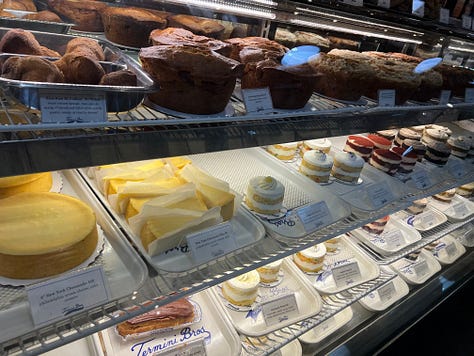
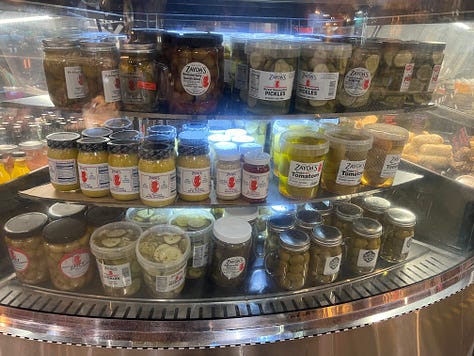
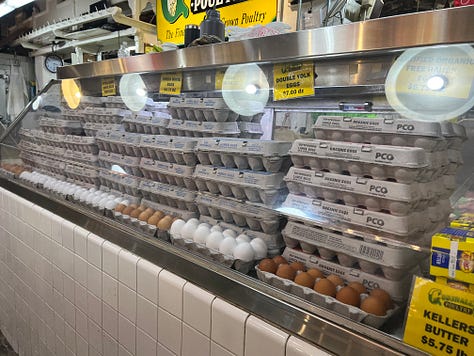
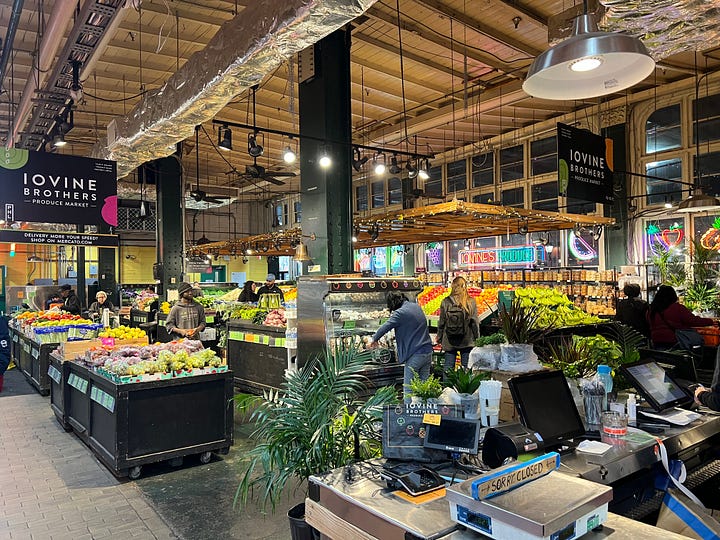
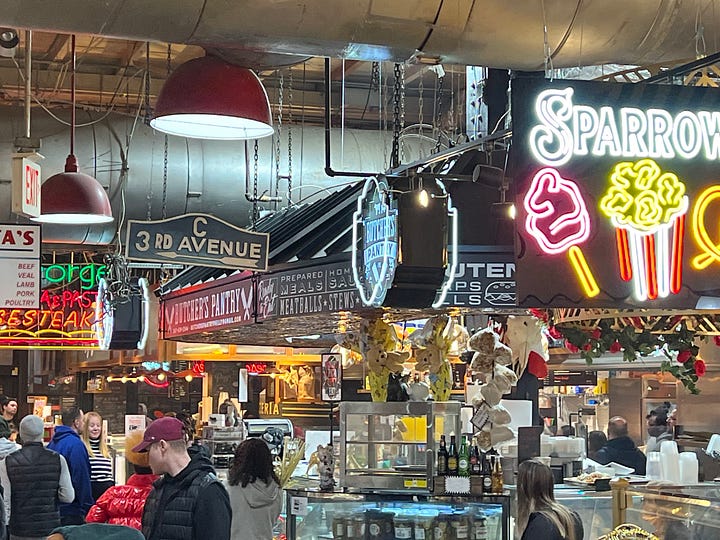
Product Throwdowns: One of my favorite things about the buying and merchandising roles I have held was sampling new products. We used to review 4-5,000 new products a year, my team approving and launching 700-1000. We would do reviews 10-11 months of the year, every week, rotating hundreds of samples through our office and test kitchen. It was fun, exhilarating and exhausting. I got to try so many things and I still am a very critical eater (and very stubborn and dogmatic about what I like and don’t like. But I earned that.). And because we want The Checkout Grocery Update to be 100% reader supported, we don’t want to take sponsorships, partnerships, endorsements or marketing funds. We want to be objective, critical and thought provoking about products, both new and incumbent. So every issue we will look at a product or two, discuss it’s key attributes, taste, appearance, use value. This week’s champion is this beauty, which I am absolutely obsessed with:
Mekhala Szechuan Chilli paste is the real deal. It is pungent, tangy, a bit spicy and very heavy on the szechuan peppercorn vibes. It is also vegan, organic, gluten free and woman owned by a Southeast Asian founder. It is authentic and legit, not white-people pandering like so much of the “ethnic” aisle. The brand has a whole line of products influenced by their Singaporean and Thai background, but this one is my favorite. I am not a great cook but adding a few teaspoons of this with some tamari to some stir fry veggies and tofu is off the charts. It is almost as good as takeout. I don’t know these folks, but wish them the best and hope they keep making delicious products.
Readings: We are digging Robyn O’Brien’s new book, Seeding Innovation. It’s a self-help book for progressive brand founders, while also being a sharp-elbowed takedown of all the reactionary, white-centric, tech-bro nonsense that is inherent to food industry finance and startup culture. Um, did that trigger you? Then you definitely need to read this. Robyn is a longtime friend and fellow traveler in the good food industry. Her first book on food allergies, GMO’s, industrial agriculture and food monopolies, The Unhealthy Truth, was a decade ahead of its time and is still relevant. Robyn does fall within the spectrum of progressive economic thought led by powerhouse women, adjacent but not identical to Kate Haworth, Marianna Mazzucato and Stephanie Kelton. But she is much more rooted in day to day enterprise operations as opposed to policy. The book is required reading if you are in the food industry and trying to make substantive change at the leadership level; CPG, sales, retail, finance. This may really help you do a lot less damage- to yourself, your co-workers, your employees, your community, and maybe even make some positive contributions to the world while making a living. Robyn has a finance background and worked for private equity and venture capital. She has the chops to take on such an intransigent sector with her punchy prose, tough love instincts and there is a lot of great data. If you are starting a business, working for an emerging brand, trying to make heads or tails of your career in management and the meaning of your work, this is a great guide book.
Grocery Nerd POV: I am watching Sprouts carefully. No, not as a stock pick, but as a grocery store option. I have always considered the chain to be “MID” (I love Gen Z slang, btw), for a few reasons. They marketed to customers alienated or not in range of Whole Foods. Their assortment was competitive but not compelling. Their produce was food service grade, and not always fresh. Their bulk bins were grungy. Not as much anymore. Under the leadership of ex-Walmart executive Jack Sinclair, they have really turned things around. They are very aggressive with new product launches and discontinuing underperforming items, and they have standout new item displays and discount racks. My guess is they make a lot of revenue on slotting and ad fees and new suppliers welcome the shot at the mainstream. They still have that low rise format, with “center store” on the perimeter and the middle taken up by produce, bulk and displays. It is an easy store to shop. The produce is much better looking and there are more organic options. Their private label is worth a closer look, which we will do soon. I can see them continue to pressure local and independent chains and mainstream supermarkets as they continue to expand. More on Sprouts to come.
And finally, track of the week. So, I dig music as much as I dig grocery retail. I will always try to share a tune or two.
This week’s track is “The Harder They Come”, by Jimmy Cliff. Jimmy also plays Ivan “Ivanhoe’ Martin in the eponymous movie, a young Jamaican man trying to make his way in the world amidst all the pressures of capitalism.
Special bonus trivia: Jimmy Cliff also covered “The Guns of Brixton” in 2012, a tune originally by The Clash from their London Calling LP. In the song, Clash singer and bassist Paul Simonon references “Ivan”, the character played by Cliff in the movie. Jimmy Cliff covering a Clash song that references Jimmy Cliff. How meta!
Peace out.



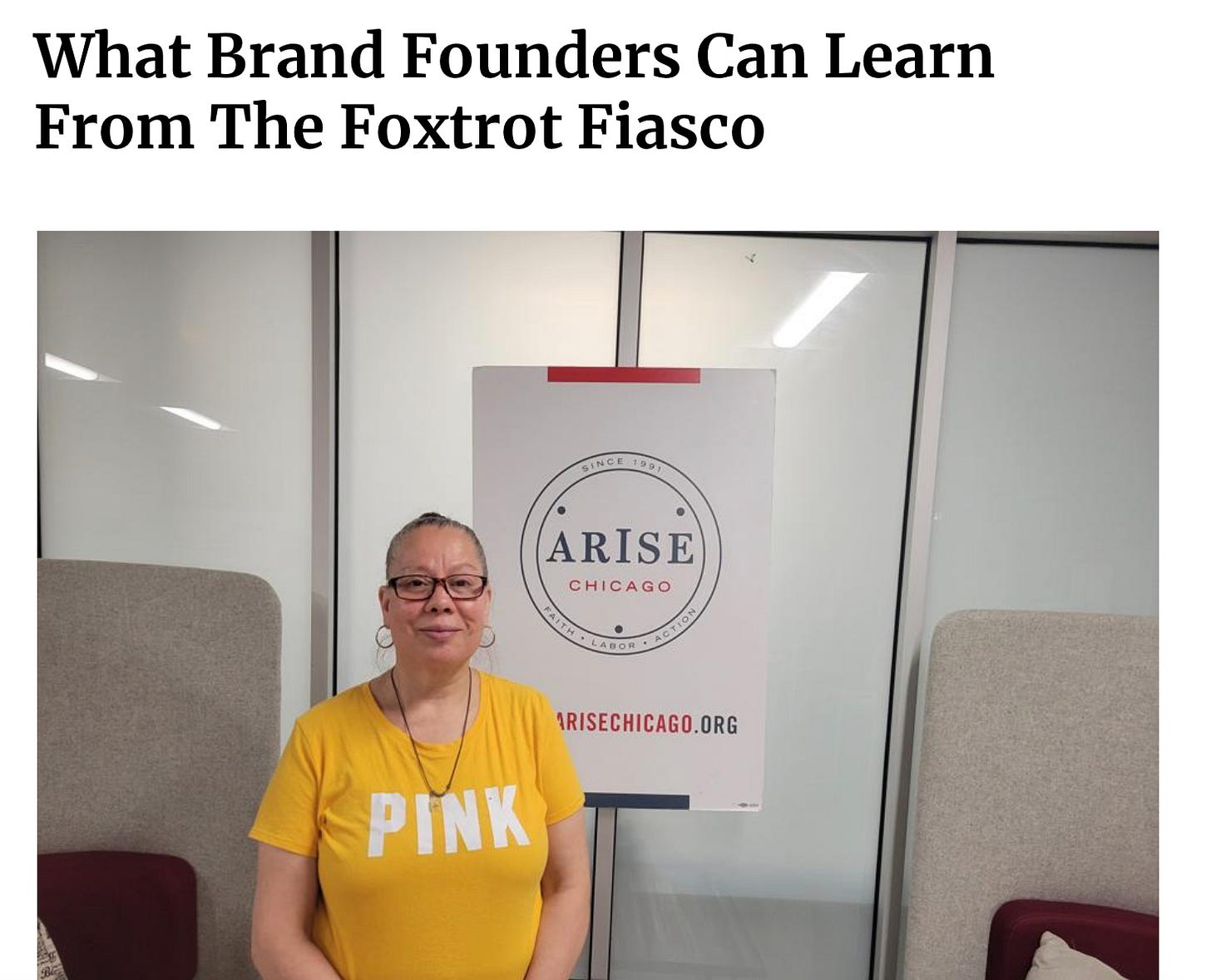
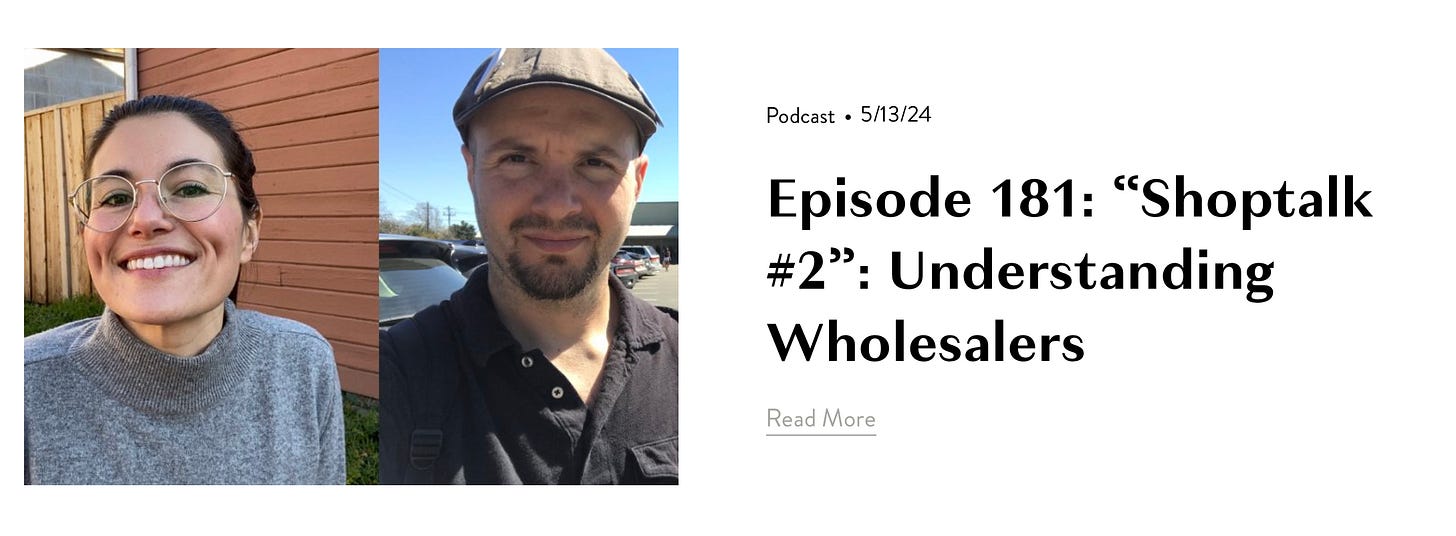
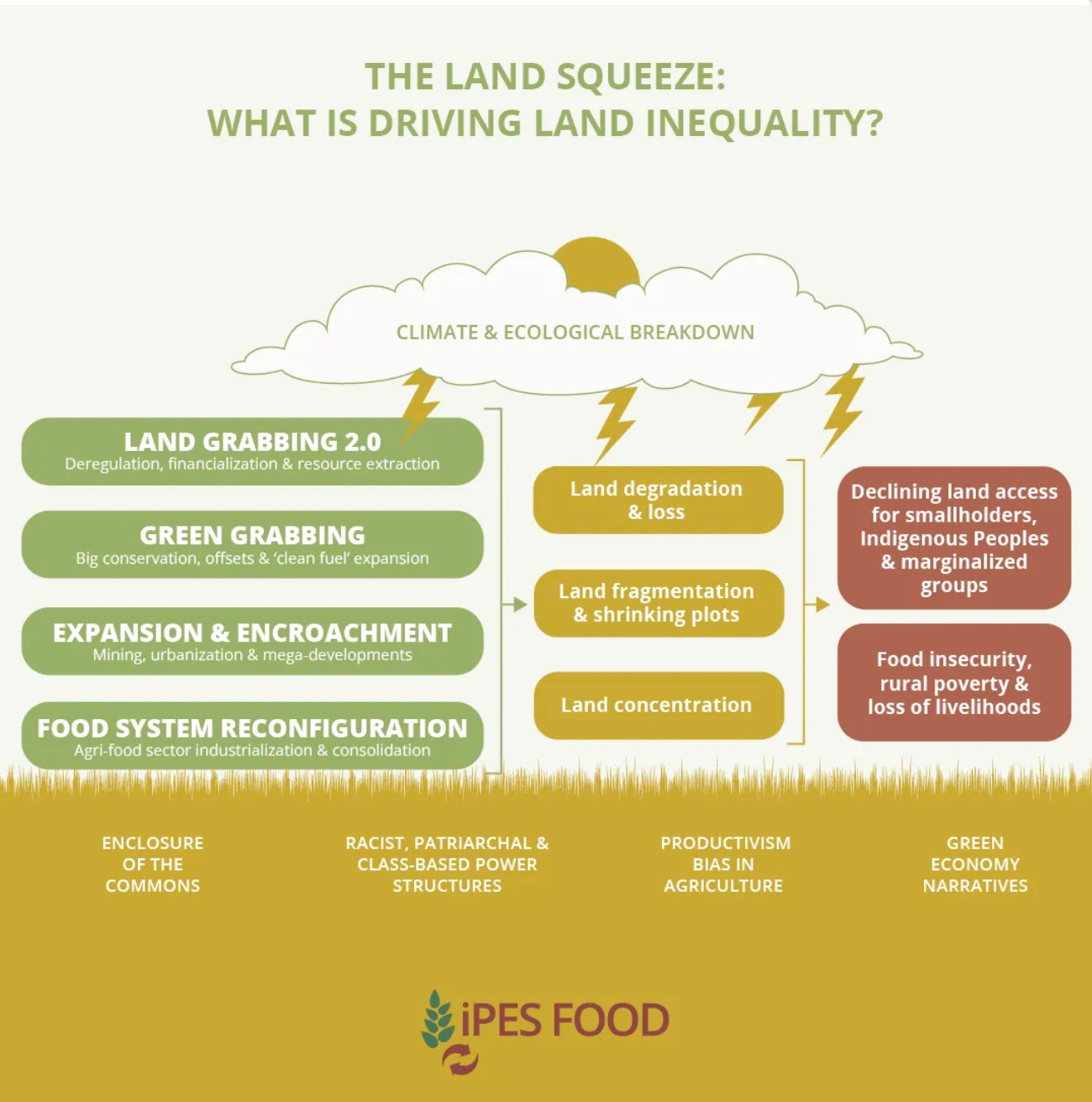
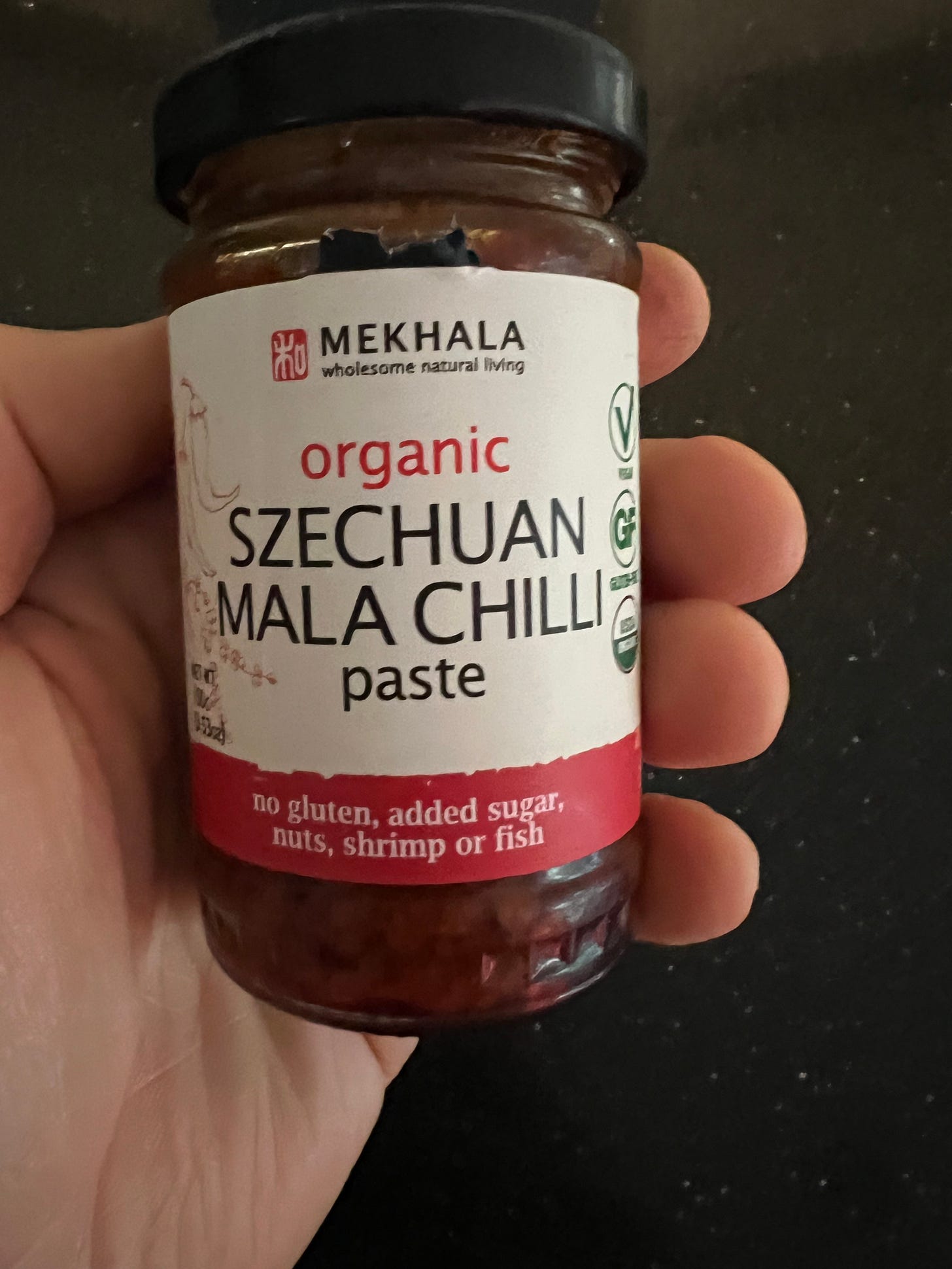
Truly one of the best in the industry, Errol aka Grocery nerd. Love the first issue and enjoy access to the Podcasts as well. A lot to unpack and looking forward to the reading more about the Land Squeeze.
Looking forward to you tracking the Walmart Bettergoods label.